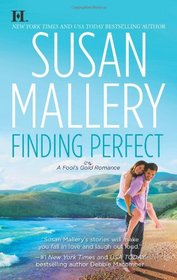Helpful Score: 2
I enjoyed the hero of "Finding Perfect" much more than the heroine, Pia, who I found to be inexplicably capricious and annoyingly irresponsible about the surprising and unusual situation she finds herself in, having been bequeathed the frozen embryos of a deceased friend.
[MINOR SPOILER ALERT AHEAD - refers to plot about 1/3 to 1/2 of the way through the novel.]
Usually, when reading a romance, I can suspend disbelief quite well, but Pia's reaction seemed even less realistic than the extraordinary situation that she found herself in. She wasn't left three orphaned children who needed immediate care; instead, she had years to consider what to do with the embryos, decide whether she was ready for single parenthood, decide what approach to embryo transfer would be best for her, etc. Instead [SPOILER ALERT] she lurches ahead nearly immediately with "implantation" of all 3 embryos, not even thinking about the health consequences, financial needs, and logistical challenges of the possibility of birthing multiples. So it was a relief, of course, to find that responsible friends and a super-responsible male hero were on hand, but it still rankles this feminist that the romance here is founded on a man making himself available as the safety net to an irresponsible woman.
Nevertheless, I still enjoyed the book overall, despite disapproving of its main character. I found the Raoul Moreno character to be both likeable and understandable as the hero and love interest, and there were enough minor characters that were interestingly drawn to make me consider reading more of Mallery's series with these recurring characters.
The only other gripes I have with the book is the fact that embryos are so often referred to as "babies", and some discomfort about how abortion is treated in the book. Though one character's bad feelings related to abortion are understandably sourced in a sense of betrayal over a former partner's dishonesty regarding an abortion, the choice to terminate a pregnancy is still presented throughout as a very negative thing, something that the main character denies vehemently, as if it were a shameful choice no matter what the situation. This whiff of anti-choice sentiment was not pervasive enough to make me put down the book, but it was definitely problematic to me while reading it.
[MINOR SPOILER ALERT AHEAD - refers to plot about 1/3 to 1/2 of the way through the novel.]
Usually, when reading a romance, I can suspend disbelief quite well, but Pia's reaction seemed even less realistic than the extraordinary situation that she found herself in. She wasn't left three orphaned children who needed immediate care; instead, she had years to consider what to do with the embryos, decide whether she was ready for single parenthood, decide what approach to embryo transfer would be best for her, etc. Instead [SPOILER ALERT] she lurches ahead nearly immediately with "implantation" of all 3 embryos, not even thinking about the health consequences, financial needs, and logistical challenges of the possibility of birthing multiples. So it was a relief, of course, to find that responsible friends and a super-responsible male hero were on hand, but it still rankles this feminist that the romance here is founded on a man making himself available as the safety net to an irresponsible woman.
Nevertheless, I still enjoyed the book overall, despite disapproving of its main character. I found the Raoul Moreno character to be both likeable and understandable as the hero and love interest, and there were enough minor characters that were interestingly drawn to make me consider reading more of Mallery's series with these recurring characters.
The only other gripes I have with the book is the fact that embryos are so often referred to as "babies", and some discomfort about how abortion is treated in the book. Though one character's bad feelings related to abortion are understandably sourced in a sense of betrayal over a former partner's dishonesty regarding an abortion, the choice to terminate a pregnancy is still presented throughout as a very negative thing, something that the main character denies vehemently, as if it were a shameful choice no matter what the situation. This whiff of anti-choice sentiment was not pervasive enough to make me put down the book, but it was definitely problematic to me while reading it.





